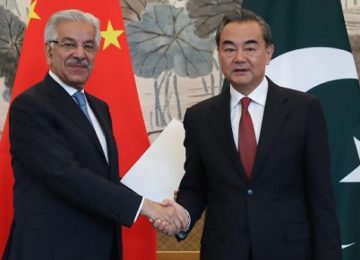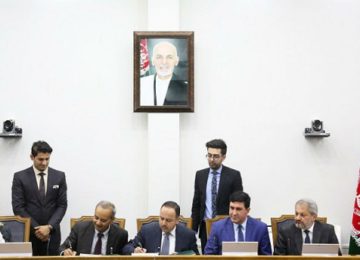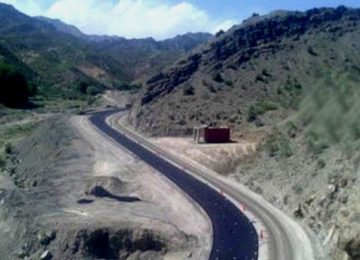By Mohsin Durrani – CRSS Research Fellow
The recent thaw in Pakistan-Russia relations is a key regional development. This thaw may well prove to be a precursor towards the realignment of forces in the region. Russia’s overtures towards Pakistan could be part of its strategy to develop new partnerships. Seriousness of these contacts became apparent with the November visit to Islamabad by the Russian Defense Minister Sergei Shoigu, during which the two countries signed a military cooperation agreement[1].
Since the Ukraine crisis, Russia has been under pressure in the international sphere. In fact, one driving imperative of Russian foreign policy in the aftermath of the Ukraine crisis[2] is now to reach out to new friends and partners who can help it challenge the West. Russia is also hunting for new defense and energy markets because of sanctions and pressure being exerted by the West.
Improved ties and its meaning for Pakistan?
It is in the long-term interest of Pakistan to establish mutually constructive relations with Russia. Efforts should be made to forge ties with Moscow without expecting immediate results, like selling arms to Pakistan, or adopting a more balanced foreign policy towards South Asia. It is through confidence building measures and cooperation on issues like terrorism, threats of destabilization in Central Asia, and formation of a consensus-based government in Afghanistan, which may bring fruition in Pakistan-Russia relations. Beginning with a thaw in the 2000s, the two countries appear to have taken their relationship to the next level with the recent transfer of MI-35 helicopters to Pakistan from Russia[3] among other engagements since then. The China Pakistan Economic Corridor (CPEC) could open up new opportunities for the landlocked countries of Central Asia and Pakistan is best placed to meet such demands.CPEC and Chinese investments in Central Asia under the Belt and Road Initiative (BRI) is also the start of the formation of a new economic and strategic bloc in the region that is going to shape the joint Foreign policy doctrine of all the stakeholders.
Improved ties and its meaning for Russia?
Russia thinks that Pakistan is a necessary part of any long-term solution in Afghanistan; it is key to a stable Afghanistan. With China endorsing a Pakistani role in deciding Afghanistan’s future, Russia sees little scope for opposing Pakistan’s role in Afghanistan. Pakistan is a large and influential Muslim country and Russia has a large Muslim population of its own. Hence, Moscow sees benefit in improved bilateral relations with Pakistan. Russia’s turn towards Pakistan also finds a fit with its own pivot to Asia, through which it wants to play a bigger role in the Indo-Pacific region. Russia hopes that improving ties with Pakistan gives it leverage at two levels. It will obtain an advantage on issues of terrorism and on Afghanistan, by building better relations with Islamabad. Pakistan also provides Russia an opportunity to undercut U.S. due to the growing presence of the Islamic State (ISIS) in Afghanistan. The inability of Afghan and U.S. security forces to exercise control Afghanistan’s territory has allowed ISIS to establish a significant presence in the country, which also threatens regional stability. A recent suicide bombing that targeted a meeting of clerics in Kabul was only the latest in a string of ISIS attacks in Afghanistan[4]. Growing ISIS presence in Afghanistan could draw in Chechen and Uzbek militants’, which concerns Russia as it fears that it may further complicate the situations in its sphere of influence and plunging the region into further volatility.
In 2014, Pakistan and Russia signed a defense cooperation agreement that led Russia to lift an arms embargo on Pakistan. Russia and Pakistan signed a $2 billion deal in 2015 to develop a 1,100-kilometer gas pipeline from Karachi to Lahore; the largest economic deal between the two countries since the Soviet Union built the Pakistan Steel Mills in the 1970s. The North-South gas pipeline with a capacity of 12.4 billion cubic meter per annum will connect the LNG terminals in Karachi to those in Lahore. The 1,100-kilometer pipeline is expected to be completed by 2018-19”[5]. Some other key milestones achieved by both the countries so far are:
- Russian Naval Chief’s historic visit to Pakistan in 2014[6].
- A landmark Defense Cooperation Agreement signed between the two countries during Russian Defense Minister’s visit to Pakistan in November 2014.[7]
- Russia lifting the arms embargo on Pakistan in 2014[8].
- Visit of Pakistan’s Army Chief to Moscow for crucial talks in 2015[9].
- Russian Spy chief’s visit to Pakistan in November 2016 to discuss intelligence sharing and anti-terrorism joint ventures[10].
- Visit of Pakistan Navy’s frigate Alamgir to the Russian port of Novorossiysk as a goodwill gesture[11].
- The arrival of Russian special forces troops in Pakistan for joint military exercises in September 2016[12].
Pak-Russia ties and Afghanistan
The Ghani administration’s softening of the ‘funded’ stance against Pakistan too has made the political atmosphere much more conducive for negotiations and confidence building measures, with Russia and China poised to play a mediating role. Afghanistan would like very much to diffuse the risk of terrorism seeping through its borders into Russia and the Central Asian states. The positive surge in Pakistan-Russia relations could prove to be their best bet to curb these concerns. Russia’s resolve to boost Pakistan’s counter-terrorism capacity may also play well for Afghanistan.
Pak-Russia ties and China
For China, Pakistan has always been its “all weather friend”. The thawing of relationship between Russia and Pakistan are born out of both countries’ close ties with China. Russia is now closer to China than to any other country because of their converging views on global governance and strategic issues bolstered by robust economic and military ties. It is desirous for both China and Russia that the American influence in the region not balloon into an even bigger hurdle then it already is. The China US relations currently are currently experiencing a Trade and Tariff Standoff. China, Pakistan and Russia being full members of the Shanghai Cooperation Organization (SCO) will only increase the frequency of economic and strategic engagements of the 3 nations.
Pak-Russia ties and India
New Delhi acknowledges Moscow’s security concerns but also understands that the Russia-Pakistan partnership would continue to evolve proportionally to India’s cooperation with USA. Russia will not become a major Pakistani partner any time soon. However, it will remain closely connected to India. But this does not mean that Russia will not seek to solidify its position or play a part in how the region shapes up, albeit all the reservations that India might have. For the time being, Pak Russia ties do not pose a major threat to India-Russia ties.
Pak-Russia ties and USA
USA’s decision to back out of the Iran nuclear deal and Washington’s evolving relationship with India have forced Pakistan to seek support elsewhere. Adding to that, the Trump administration’s ability to antagonize USA’s strong allies and its inability to make thoughtful foreign policy choices, it is unlikely that the Trump administration will succeed in opposing growing Russian influence in South and Central Asia. So far, the US is yet to realise that a solution to lasting peace in Afghanistan is only possible with the inclusion of Pakistan, Russia and China in the process.
It is high time that a paradigm shift takes place from the Cold War Era ‘zero-sum’ approach to a people-centered cooperative security driven economic and strategic partnership for the progress of the region. Only time will tell how fruitful the collaboration between Russia and Pakistan turns out to be. There is much scope for trade, economic, scientific and cyber cooperation between Pakistan and Russia. Both countries have elicited their desire on numerous occasions for closer economic cooperation. It is also important that Russia, Pakistan and Central Asian states should resolve outstanding issues by evolving a regional framework beneficially in favour of all the major stakeholders. Moreover, it is also high time for India to realize that only regional cooperation – that includes major stakeholders like Russia, China, Pakistan, Iran and Afghanistan – is the key to a peaceful and prosperous South and Central Asia.
Notes:
[1] https://www.dawn.com/news/1145786
[2] https://carnegie.ru/commentary/72799
[3] https://thediplomat.com/2017/08/pakistan-receives-4-advanced-attack-helicopters-from-russia/
[4] https://www.cbsnews.com/news/afghanistan-loya-jirga-suicide-bomb-attack-kabul-islamic-clerics-fatwa/
[5] https://pabausa.org/791/pakistan-russia-ink-agreement-on-2-billion-north-south-gas-pipeline/
[6] https://www.dawn.com/news/1126966
[7] https://www.dawn.com/news/1145875
[8] https://thediplomat.com/2014/06/russia-ends-arms-embargo-against-pakistan/
[9] https://tribune.com.pk/story/904003/army-chief-arrives-in-russia-for-crucial-talks-ispr/
[10] https://tribune.com.pk/story/1756610/1-pakistan-hosts-spy-chiefs-russia-china-iran/
[11] http://www.app.com.pk/pn-ship-reaches-russia-on-goodwill-visit/
[12] https://sputniknews.com/asia/201609241045655264-russia-pakistan-drills-defense/
© Center for Research and Security Studies (CRSS) and Afghan Studies Center (ASC), Islamabad.








